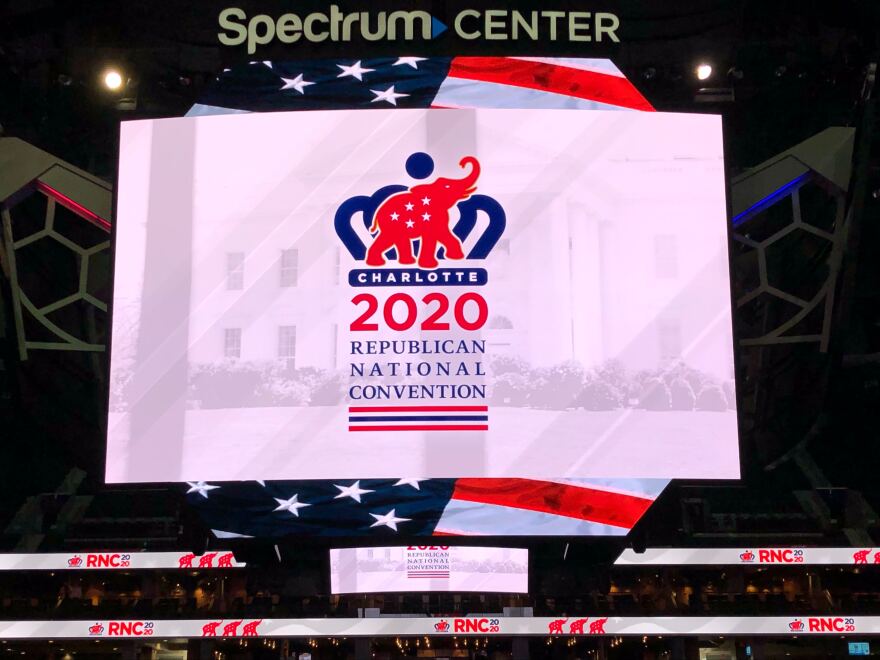Charlotte is just seven months away from hosting the Republican National Convention – and there are a lot of preparations to make and questions to be answered. WFAE’s new podcast Inside Politics, the RNC in Charlotte, looks at the RNC and the 2020 election through the lens of Charlotte. It launched Thursday.
Joining Gwendolyn Glenn are the podcast’s co-hosts – WFAE’s political reporter Steve Harrison and Lisa Worf, who you usually hear on Morning Edition.
Gwendolyn Glenn: Good afternoon to you both. So what’s the idea behind this podcast?
Steve Harrison: Well, of course, Charlotte put on the Democratic National Convention in 2012. But the city has changed a lot since then – many more people live uptown, we have more hotels and bars and restaurant. Going back eight years ago, there were 4,400 hotel rooms uptown, and now there are 5,600, with more under construction.
In many ways, Charlotte can be a better host than it was in 2012. It’s certainly big enough, and this time around, the Democrats are in the “small city” -- Milwaukee. That was Charlotte in 2012.
But at the same time, Charlotte has changed in terms of who it is. The city is now overwhelmingly Democratic and hosting President Trump has been a source of division.
Lisa Worf: And that means there is plenty to explore. We’ve been digging into some of those tensions, looking at how a convention uses its host city to build its message, who may win and lose economically – as well as what it will take to put on this convention and, well, put up with it as a Charlotte resident.
Glenn: You kick off the podcast with a look at how the city came to host the RNC – and that’s a longer road than I think many people realize.
Worf: Right, you might think it started with the 2012 DNC, but it actually started 20 years ago … with a trip in a limo around Charlotte Motor Speedway.
Harrison: Yes, Mayor Pat McCrory, met a bunch of Republican officials at Charlotte Motor Speedway who were scoping out the city -- and took them around the track in a limo. Here’s what McCrory told me about that bid.
McCrory: It was almost laughable, the bid we put in, and the seriousness that we tried to put on the proposal when in fact we weren’t even in the ball game. Because we did not have a viable convention center or hotel or frankly anything to do in downtown Charlotte.
Worf: And that was the first of two failed bids to get a national political convention here. But then the parties saw the value of placing conventions in battleground states – and that certainly helped Charlotte secure the DNC in 2012.
Harrison: And with the RNC, well, Charlotte was the only city to bid on it. Las Vegas was the other finalist - but that bid came from the state Republican Party, not the city or the tourism authority.
Glenn: What have you noticed is different about this convention and Charlotte compared to when the DNC was here eight years ago?
Worf: So, one change is that eight years ago, it was a real bi-partisan effort to land the convention -- and to host it. Pretty much every Republican thought it was a good idea for the city to be in the spotlight. And that’s not the case this go-around.
Harrison: This will likely be the first convention in which an impeached president is nominated, so that will go down in the history books.
Glenn: What are some key things that still need to be decided about the RNC?
Worf: The host committee is raising money, and they have to come up with $70 million per their contract with the Republican National Committee. That’s twice as much as the Charlotte committee had to raise eight years ago
Harrison: And if you live here, security is still the big unknown. I think people are going to feel this convention a little more. They haven’t announced the security footprint yet around the arena, but officials expect it to be bigger than it was eight years ago.
Worf: And even though the protests in 2012 were really small -- that was the remnants of the Occupy Wall Street movement -- Charlotte is going to be expecting more activity, both for and against president Trump. Just look at what’s happened recently in Virginia, with the large -- but peaceful -- Second Amendment protests.
Glenn: That’s WFAE’s Lisa Worf and Steve Harrison, hosts of WFAE’s new podcast Inside Politics, the RNC in Charlotte. You can listen to it onwfae.org/insidepolitics and wherever podcasts are available.




